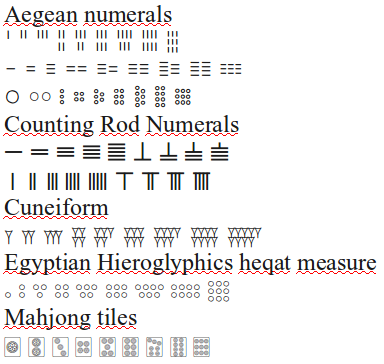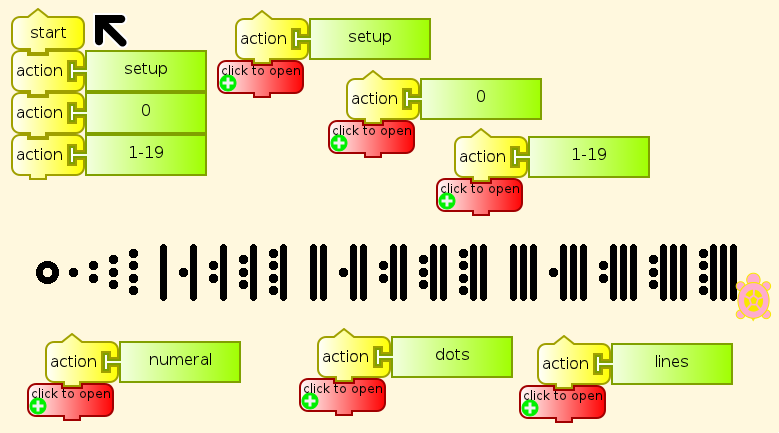Difference between revisions of "Activities/Turtle Art/Tutorials/Numerals"
(Visual numerals as text) |
m (Fix links) |
||
| Line 2: | Line 2: | ||
[[File:]] | [[File:]] | ||
| + | |||
Counting Rod Numerals and Mayan numerals (below) show clear indications of counting on fingers up to five, then with a whole hand for five plus fingers of the second hand, as in Roman numerals. | Counting Rod Numerals and Mayan numerals (below) show clear indications of counting on fingers up to five, then with a whole hand for five plus fingers of the second hand, as in Roman numerals. | ||
| Line 55: | Line 56: | ||
No matter. We can still teach the Turtle to write numbers in Mayan glyphs in base 20.Only the shell glyph for 0 requires any real thought. | No matter. We can still teach the Turtle to write numbers in Mayan glyphs in base 20.Only the shell glyph for 0 requires any real thought. | ||
| − | [[File:TAMayanNumerals.png | + | [[File:TAMayanNumerals.png]] |
An advantage of any of these systems is that pre-literate preschoolers can deal with them by counting before they have memorized the conventional digits. We can actually animate arithmetic in these numerals, by taking them apart into their constituents and reassembling them. Here are a few frames. | An advantage of any of these systems is that pre-literate preschoolers can deal with them by counting before they have memorized the conventional digits. We can actually animate arithmetic in these numerals, by taking them apart into their constituents and reassembling them. Here are a few frames. | ||
| − | [[File:TAVisualNumeralAddition | + | [[File:TAVisualNumeralAddition]] |
| + | |||
| + | Dice are also visual, but go up only to six, with no 0. | ||
| − | + | ⚀ ⚁ ⚂ ⚃ ⚄ ⚅ | |
Revision as of 09:27, 17 July 2011
The numerals used in various languages, living and extinct, show their origins in stroke marks or scores (cuts), like the Chinese , and early forms of some Hindu-Arabic-European numerals.
[[File:]]
Counting Rod Numerals and Mayan numerals (below) show clear indications of counting on fingers up to five, then with a whole hand for five plus fingers of the second hand, as in Roman numerals.
i ii iii iiii v vi vii viii viiii
or
I II III IIII V VI VII VIII VIIII
with the later abbreviations iv and IV for iiii and IIII, and ix/IX for viiii/VIIII.
These number systems are of the same structure as the Chinese and Japanese abacuses (abaci?) and the Roman counting board with its little pebbles (Latin, calculus/calculi, whence calculation and Differential and Integral Calculus).
Mayan numerals go up to 20, which is often interpreted as counting on fingers and toes, with groupings of five for hands and feet, although we have no other evidence for how they began. Here are the visual numerals that have made it into Unicode as characters, first as a graphic, so that you can see them even if you do not have all of the fonts needed to display them. Then I have provided them as text so that you can test which fonts you lack.
Aegean Numerals
𐄇 𐄈 𐄉 𐄊 𐄋 𐄌 𐄍 𐄎 𐄏
𐄐 𐄑 𐄒 𐄓 𐄔 𐄕 𐄖 𐄗 𐄘
𐄙 𐄚 𐄛 𐄜 𐄝 𐄞 𐄟 𐄠 𐄡
Counting Rod Numerals
𝍠𝍡𝍢𝍣𝍤𝍥𝍦𝍧𝍨
𝍩𝍪𝍫𝍬𝍭𝍮𝍯𝍰𝍱
Cuneiform
𒐕𒐖𒐗𒐘𒐙𒐚𒐛𒐜𒐝
Egyptian Hieroglyphics Heqat Measure
𓃉 𓃊 𓃋 𓃌 𓃍 𓃎 𓃏 𓃐 𓃑
Mahjong Tiles
🀙 🀚 🀛 🀜 🀝 🀞 🀟 🀠 🀡
It should be obvious that having a Turtle write these numbers is fairly simple to do. We can create TA stacks for each digit in one of these systems, and display whatever sort of arithmetic we want. For example,
We can also put these numerals on Turtle Art tiles as text, thus.
Mayan is also a candidate in part because it is the only one of these number systems with a zero, but Mayan has not yet been added to Unicode.
No matter. We can still teach the Turtle to write numbers in Mayan glyphs in base 20.Only the shell glyph for 0 requires any real thought.
An advantage of any of these systems is that pre-literate preschoolers can deal with them by counting before they have memorized the conventional digits. We can actually animate arithmetic in these numerals, by taking them apart into their constituents and reassembling them. Here are a few frames.
Dice are also visual, but go up only to six, with no 0.
⚀ ⚁ ⚂ ⚃ ⚄ ⚅


